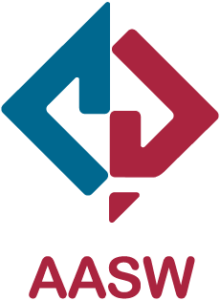FAQs
FAQs
Below are some frequently asked questions related to studying social work in Australia.
The list of accredited courses can be found on our website.
This is a list of AASW Accredited Social Work programs by State and Higher Education Provider that provide a graduate with eligibility for membership of the AASW.
A list of discontinued courses can be found on our website.
These courses also provide eligibility for membership of the AASW.
The Australian Social Work Education and Accreditation Standards (ASWEAS) set out the principles, standards and graduate attributes for social work education in Australia. The standards are used as the criteria for the accreditation of a professional social work course with the AASW.
A copy of the Standards and associated guidelines can be found on our website.
As a self-regulating profession, the AASW is responsible for setting the education standards for entry into the social work profession. These standards are articulated in the Australian Education and Accreditation Standards (ASWEAS). These standards set out the minimum standards for the delivery of a social work program at entry level by a higher education provider.
In essence, there are two different types of programs offered to study at an entry level into the profession. A Bachelor of Social Work or Bachelor of Social Work (Honours) is typically a four year degree which combines an academic social science program with social work education and offered at an AQF Level 7 / 8 (Honours) A Master of Social Work (Qualifying) is typically two years in duration and available to students who already hold a relevant social science undergraduate degree and is offered at an AQF Level 9. The AASW does not have an accreditation role for advanced practice social work programs.
Other than the entry pathway, there is no difference between the programs – one is not preferred over the other. Both programs are entry into the profession and both are accredited against the ASWEAS in the same manner.
An accredited course refers to the program being recognised as delivering against the minimum standards as outlined in the ASWEAS for entry into the profession and that graduates are therefore able to practice as professional social workers.
By studying an accredited program, students are eligible for student membership of the AASW. Once graduated from an accredited program you will be eligible for full membership including the new graduate membership category.
Provisional accreditation refers to:
- A new social work program. Programs are provisionally accredited until completion of the first student cohort. At this time, a review is conducted with a view to full accreditation.
- Existing programs where the program is being reviewed outside of re-accreditation schedules. Provisional accreditation does not impact graduates of a course with this status. Graduates have the same eligibility and standing as graduates of fully accredited programs.
Students enrolling in a provisionally accredited course are still eligible for membership of the AASW.
The word “qualifying” means that the course qualifies a graduate for entry into the profession of social work. Some providers refer to the entry level program as just Master of Social Work or Master of Social Work (Graduate entry), with “graduate entry” referring to the fact that a student enrolling needs to have a relevant social science qualification on entry. The “qualifying” means that the course allows entry into the profession. Please make sure that the course you are considering enrolling into is the course that is listed on our website, if you wish to gain eligibility of full membership of the AASW upon completion of your course.
The AASW does not get involved in individual situations. Higher education providers are accredited against compliance related to the requirements of the minimum standards illustrated in the ASWEAS – field education being one of them. Students are encouraged to raise issues with those from the education provider involved in field education and to access the escalation policy of the provider when felt appropriate.
We expect that the first port of call for students is to contact their Higher Education Provider or University. The AASW can only provide general information about the ASWEAS. The AASW does not have a designated role in making decisions at an individual student level regarding a student’s placement planning or circumstances. If a HEP would like to discuss their accreditation or application of the ASWEA Standards, they can contact the AASW HEP Team via [email protected] or on 03 9320 1000 (ext. 4).

